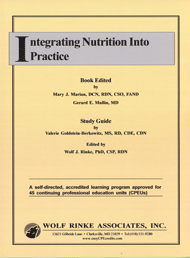|
|
|
||||||||||||||
|
List of All Activities
Share an Activity: Order Form |
|||||||||||||||
| Integrating Nutrition Into Practice*
This CPE activity, written by experts in their fields, is organized in a systematic manner that presents the scientific data using an evidence-based, how-to approach, addressing topics such as:
Although unanswered questions still exist, this resource gives you a much-needed guide to the information currently available on nutrition and lifestyle-based therapies. NOTE: Some of the information in this CPE program represents an emerging area which requires additional outcomes evidence. Share with a friend and Save! Click here for important information about
sharing.
Integrating Nutrition Into Practice © 2024 Wolf Rinke Associates. All rights reserved for this self-directed accredited learning activity. Reproduction in whole or part without written permission, except for brief excerpts, is prohibited. LEARNING OBJECTIVES Upon completion of this CPE program you will be better able to:
ABOUT THE EDITORS OF THE BOOK Dr. Mary J. Marian is an assistant professor of practice and director of the Didactic Program in Dietetics in the Department of Nutritional Sciences at the University of Arizona. Dr. Marian is also the nutritionist and dietitian for Arizona Oncology Associates. She is a faculty member with the Integrative Medicine Program at the University of Arizona. Mary is widely published and has given numerous presentations both nationally and internationally. She has also served on numerous committees for the Academy of Nutrition and Dietetics as well as the American Society for Parenteral and Enteral Nutrition (ASPEN). She has been the chair for Dietitians in Nutrition Support and served on the board of directors for ASPEN. Dr. Gerard E. Mullin is an associate professor in the Department of Medicine at The Johns Hopkins Hospital where he chairs the hospital’s Nutrition Advisory Committee. He is an internist, gastroenterologist, and nutritionist. Dr. Mullin is nationally and internationally renowned for his work in integrative gastroenterology and nutrition. He has accumulated more than 20 years of clinical experience in the field of integrative gastroenterology and earned his master’s degree in nutrition while in practice. If you prefer to order by phone, mail or fax click below Order Formor click here to contact us with other questions. For information about our other products and services return to the sidebar at the top of the page. |
|||||||||||||||



